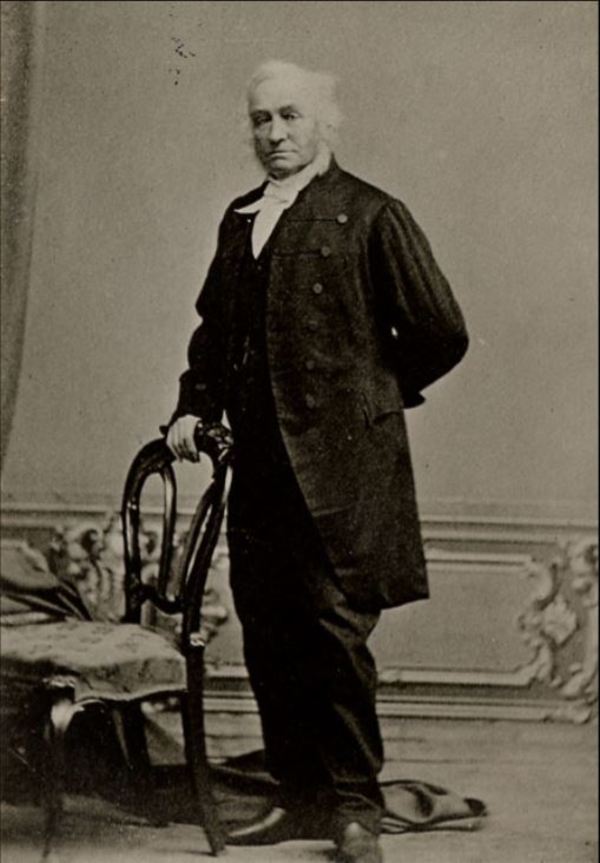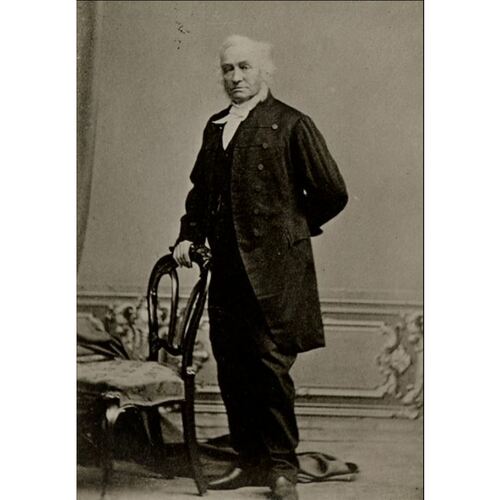
Source: Link
HALE, EDWARD, businessman, mha, and legislative councillor; b. 6 Dec. 1800 at Quebec, second son of the Honourable John Hale* and Elizabeth Frances Amherst*, sister of Lord William Pitt Amherst; d. 26 April 1875 at Quebec.
Edward Hale is sometimes confused with his uncle and namesake, the seigneur of Portneuf, who died in 1862. His father was a member of both the Legislative and the Executive councils of Lower Canada; his brother, Jeffrey Hale*, was an important figure at Quebec, where a hospital still bears his name. Edward Hale was educated at Kensington, England, in a private school, where he seems to have attained a level of knowledge equivalent to that of today’s secondary schools. His voluminous correspondence, in which he expresses himself with elegance, precision, and humour, gives evidence of remarkable learning. In 1820 he returned to Quebec, where he was appointed a secretary in the office of the auditor general of the province of Lower Canada.
Edward Hale spent the years 1823 to 1828 in India as private secretary to his uncle, Lord Amherst, who was then its governor general. On 10 March 1831, having returned to Quebec, he married Eliza Cecilia Bowen, daughter of Edward Bowen*, chief justice of the Superior Court of Lower Canada; they had seven children, one of whom, Edward John, married the granddaughter of Jonathan Sewell*.
Life as a public servant does not seem to have appealed strongly to Edward Hale. As early as the summer of 1833 he thought of settling in the Eastern Townships, and gathered information from compatriots already established at Drummondville, Sherbrooke, and Richmond. On 18 Feb. 1834 his uncle Edward Hale, of Portneuf, congratulated him on having bought a farm at Sherbrooke, sent him seed, and discussed the timber trade with him. Hale built a house on the banks of the Rivière Saint-François, probably during 1834. On 14 October of the same year, Peter McGill* asked him for information about the Eastern Townships, on behalf of immigrants who wanted to buy land from the British American Land Company: Hale eventually became one of the shareholders of this company, of which for a time Alexander Tilloch Galt* was secretary. Hale spent the years after 1834 developing his holdings.
During the 1837–38 disturbances, Hale served “for some weeks” with the Sherbrooke volunteers as the colonel’s secretary. He was considered an important citizen of the Eastern Townships and was nominated to the Special Council. Thomas Leigh Goldie informed him of the appointment on 27 Aug. 1839, and on 2 September he accepted. He voted for the resolutions on the union of Upper and Lower Canada on 13 November.
On 6 Aug. 1840 the governor general, Lord Sydenham [Thomson*], divided Lower Canada into 22 municipal districts and appointed wardens for each of them. Edward Hale was chosen to preside over the district council of Sherbrooke. The new officials found themselves charged with important responsibilities both for the municipalities and for education. Edward Hale’s correspondence with Dr Jean-Baptiste Meilleur, concerning the schools in his district, showed that he carried out his task conscientiously.
In 1841, at the time of the elections for the new parliament, Edward Hale was asked to stand in Sherbrooke. His opponent was Colonel Bartholomew Conrad Augustus Gugy, who had already represented this constituency in the House of Assembly of Lower Canada from 1831 to 1838. Gugy even wrote to Hale on 21 March 1841, to ask him to withdraw from the electoral struggle, but Hale refused to do so. Gugy was defeated, disputed the election, and lost his appeal.
Edward Hale went to the sessions of the assembly regularly, whether at Kingston or Montreal. His correspondence with his wife shows that he was most assiduous in attending the sittings of the house and interested in the different questions debated there. But these duties were prejudicial to his business, and on 17 Nov. 1847 he informed William Badgley*, who had just been appointed attorney general for Lower Canada, of his intention not to stand at the next elections. His successor as mha for Sherbrooke was Colonel Gugy. In 1867, when the province of Quebec was set up, Edward Hale agreed to sit on the Legislative Council for the division of Wellington, and remained a member until his death.
Edward Hale was a businessman of some standing: in the three townships of Shipton, Eaton, and Simpson alone he owned nearly 4,000 acres of land; in that of Brompton, he owned seven lots “in good condition.” His correspondence reveals him as a man much taken up with the sale of land, mortgages, loans, the negotiating of interest, and farm activities; farmers would write to borrow money, buy pieces of land, pay their interest, or request extensions of time. Hale was often urged to establish a branch of the Bank of Montreal at Sherbrooke, but none was opened in the town until 1908. He placed funds in the Eastern Townships Bank; when it was amalgamated with the Canadian Bank of Commerce in 1912, the Hale estate still had $12,000 in it. He also had an interest in the Stanstead and Sherbrooke Mutual Fire Insurance Company, of which he was president from 1865 until his death, and gave much attention to the Sherbrooke Agricultural Society. Finally, Hale was associated with the project, proposed in 1843 by A. T. Galt, for the construction of a railway linking Montreal and Boston and passing through the Eastern Townships; he was a member of the sub-committee responsible for drawing up plans. In 1845 the St Lawrence and Atlantic Railway received a charter, the railhead decided on being Portland (Maine) rather than Boston [see Poor]. Hale was on the provisional committee formed to supervise the undertaking.
In 1866 Edward Hale was appointed chancellor of the University of Bishop’s College, in recognition of his services to the Church of England in the Eastern Townships. He died at his son’s residence at Quebec, and was buried at Sherbrooke.
ANQ, Famille Hale. PAC, MG 23, G II, 18 (John Hale papers). Bishop’s University Archives (Lennoxville, Que.), Minutes of the corporation, 1866–75. Holy Trinity Cathedral (Quebec), marriage registers, 1831. McCord Museum (McGill University, Montreal), Hale family papers. St Peter’s Church (Sherbrooke, Que.) burial registers, 29 April 1875. Stanstead and Sherbrooke Insurance Company (Sherbrooke, Que.), Minutes, 1865–75. Cyclopædia of Can. biog. (Rose, 1888), 518–20. Turcotte, Conseil législatif de Québec, 9, 298. Chapais, Histoire du Canada, V. O. D. Skelton, The life and times of Sir Alexander Tilloch Galt (Toronto, 1920). L.-P. Audet, “La surintendance de l’éducation et la loi scolaire de 1841,” Cahiers des Dix, XXV (1960), 147–69.
Cite This Article
Louis-Philippe Audet, “HALE, EDWARD,” in Dictionary of Canadian Biography, vol. 10, University of Toronto/Université Laval, 2003–, accessed December 20, 2025, https://www.biographi.ca/en/bio/hale_edward_10E.html.
The citation above shows the format for footnotes and endnotes according to the Chicago manual of style (16th edition). Information to be used in other citation formats:
| Permalink: | https://www.biographi.ca/en/bio/hale_edward_10E.html |
| Author of Article: | Louis-Philippe Audet |
| Title of Article: | HALE, EDWARD |
| Publication Name: | Dictionary of Canadian Biography, vol. 10 |
| Publisher: | University of Toronto/Université Laval |
| Year of publication: | 1972 |
| Year of revision: | 1972 |
| Access Date: | December 20, 2025 |



